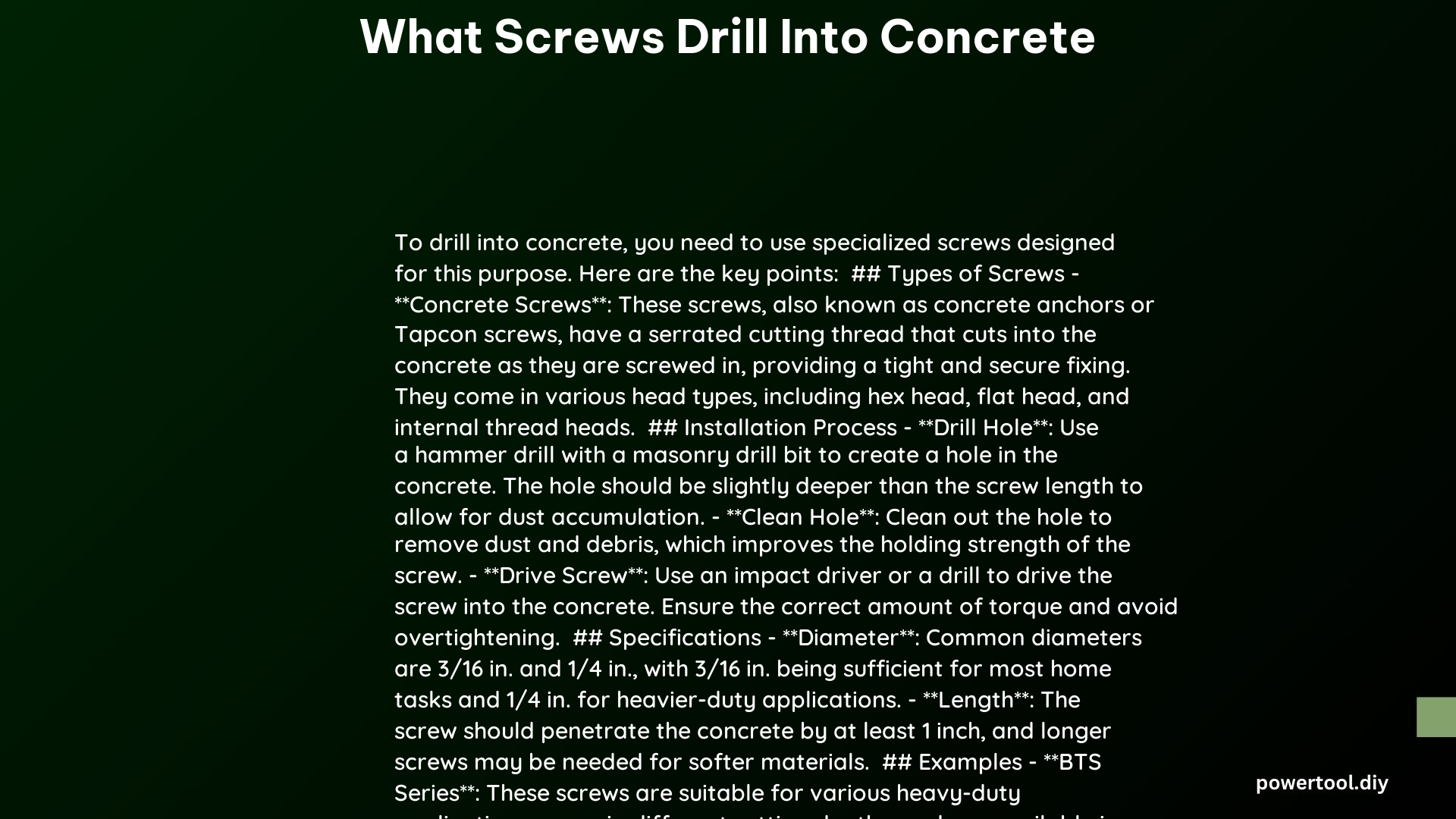Concrete screws, also known as masonry screws or Tapcon® screws, are specifically designed to drill into concrete, brick, block, and other masonry materials. These specialized fasteners feature unique thread designs and materials that allow them to create their own threads in hard surfaces, providing a secure hold without the need for anchors or expansion bolts. This guide explores the types, specifications, and installation methods of concrete screws.
What Are the Main Types of Concrete Screws?
Concrete screws come in various types, each designed for specific applications:
- Tapcon® Screws: The most common type, available in blue-coated carbon steel or stainless steel.
- Hex Washer Head Screws: Ideal for heavy-duty applications, providing a larger bearing surface.
- Flat Head Screws: Suitable for flush mounting applications.
- Concrete Nail Screws: Combine the ease of nailing with the holding power of screws.
What Are the Key Specifications of Concrete Screws?

Understanding the specifications of concrete screws is crucial for proper selection and use:
| Specification | Details |
|---|---|
| Diameter | Typically 3/16″ or 1/4″ |
| Length | Ranges from 1-1/4″ to 6″ |
| Thread Type | High-low threads for self-tapping |
| Material | Carbon steel with Blue Climaseal® coating or 410 stainless steel |
| Load Ratings | Varies based on size and base material |
How Do You Choose the Right Concrete Screw Size?
Selecting the appropriate size depends on several factors:
- Base Material: Different masonry materials require different screw sizes.
- Load Requirements: Heavier loads need larger diameter screws.
- Embedment Depth: Minimum 1 inch, maximum 1-3/4 inches.
- Project Specifics: Consider the thickness of the material being fastened.
What Are the Installation Steps for Concrete Screws?
Proper installation is key to the effectiveness of concrete screws:
- Mark the drilling spot
- Select the correct drill bit size (5/32″ for 3/16″ screws, 3/16″ for 1/4″ screws)
- Drill a pilot hole 1/4 inch deeper than the screw length
- Clean the hole thoroughly
- Insert the screw and drive it in with an impact driver or drill
What Tools Are Needed for Installing Concrete Screws?
Essential tools for concrete screw installation include:
- Hammer drill or rotary hammer
- Carbide-tipped masonry drill bits
- Impact driver or power drill
- Appropriate screwdriver bits
- Safety glasses and dust mask
What Are the Load Ratings for Concrete Screws?
Load ratings vary based on screw size and base material:
| Screw Size | Base Material | Pull-Out Load | Shear Load |
|---|---|---|---|
| 3/16″ | 2000 PSI Concrete | 600 lbs | 720 lbs |
| 1/4″ | 2000 PSI Concrete | 750 lbs | 900 lbs |
| 3/16″ | Lightweight Block | 340 lbs | 730 lbs |
| 1/4″ | Lightweight Block | 500 lbs | 1000 lbs |
What Are the Best Practices for Using Concrete Screws?
To ensure optimal performance:
- Always pre-drill holes
- Use the correct drill bit size
- Clean holes thoroughly before insertion
- Don’t over-tighten screws
- Use corrosion-resistant screws for outdoor applications
- Consider using a thread-locking compound for high-vibration environments
What Are Common Applications for Concrete Screws?
Concrete screws are versatile and can be used in various scenarios:
- Mounting electrical boxes
- Installing furring strips
- Securing framing to concrete walls
- Attaching signage to masonry surfaces
- Fastening metal tracks for drywall installation
- Anchoring shelving units to concrete walls
How Do Concrete Screws Compare to Other Fasteners?
Concrete screws offer several advantages over traditional anchors:
- No need for separate anchors
- Removable and reusable
- Faster installation process
- Provide a flush finish
- Suitable for both interior and exterior use
However, they may not be suitable for extremely heavy loads or in situations where frequent removal is required.
What Safety Precautions Should Be Taken When Using Concrete Screws?
Safety is paramount when working with concrete screws:
- Always wear safety glasses and a dust mask
- Use hearing protection when operating power tools
- Ensure proper ventilation in enclosed spaces
- Follow manufacturer’s guidelines for load ratings
- Inspect screws and tools regularly for wear or damage
By understanding the types, specifications, and proper use of concrete screws, you can ensure secure and efficient fastening in masonry materials. Always consult local building codes and manufacturer recommendations for specific applications to guarantee safe and compliant installations.
References:
1. Tapcon Concrete Anchors – Tapcon
2. Technical Specifications for Tapcon® Concrete Screws – Confast
3. Self Tapping Concrete Screws – All Points Fasteners
